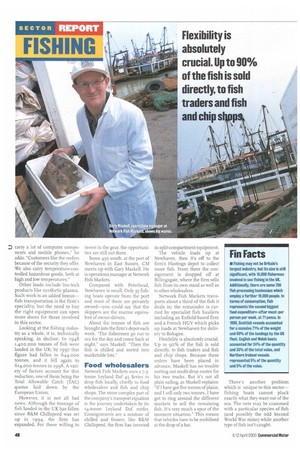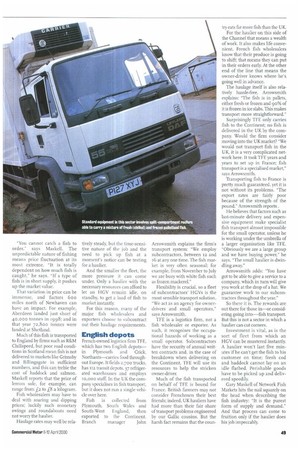carry a lot of computer components and mobile phones," he
Page 50

Page 51

If you've noticed an error in this article please click here to report it so we can fix it.
adds. "Customers like the reefers because of the security they offer. We also carry temperature-controlled hazardous goods, both at high and low temperatures."
Other loads include bio-tech products like synthetic plasma. Such work is an added bonus fishtransportation is the firm's speciality, but the need to buy the right equipment can open more doors for those involved in this sector.
Looking at the fishing industry as a whole, it is, technically speaking, in decline. In 1948 1,400,000 tonnes of fish were landed in the UK; by /997 that figure had fallen to 644,000 tonnes, and it fell again to 614,000 tonnes in 1998. A variety of factors account for this reduction, one of them being the Total Allowable Catch (TAC) quotas laid down by the European Union.
However, it is not all bad news. Although the tonnage of fish landed in the UK has fallen since R&M Chilispeed was set up in 1994, the firm has expanded. For those willing to invest in the gear, the opportunities are still out there.
Some 450 south, at the port of Newhaven in East Sussex, CM meets up with Gary Maskell. He is operations manager at Network Fish Markets.
Compared with Peterhead, Newhaven is small. Only 35 fishing boats operate from the port and most of them are privately owned—you could say that the skippers are the marine equivalent of owner-drivers.
About Go tonnes of fish are brought into the firm's depot each week. "The fishermen go out to sea for the day and come back at night," says Maskell. "Then the fish is chilled and sorted into marketable lots."
Food wholesalers
Network Fish Markets uses a 7.5tonne Leyland Daf 45 Series to drop fish locally, chiefly to food wholesalers and fish and chip shops. The more complex part of the company's transport equation is the journey undertaken by its 14-tonne Leyland Daf reefer. Consignments are a mixture of chilled and frozen; like R&M Chillspeed, the firm has invested in split-compartment equipment.
The vehicle loads up at Newhaven, then it's off to the firm's Hastings depot to collect more fish. From there the consignment is dropped off at Billingsgate, where the firm sells fish from its own stand as well as to other wholesalers.
Network Fish Markets transports about a third of the fish it deals in; the remainder is carried by specialist fish hauliers including an Enfield-based firm and a French HGV which picks up loads at Newhaven for delivery to Bologne.
Flexibility is absolutely crucial. Up to 9o% of the fish is sold directly, to fish traders and fish and chip shops. Because these orders have been placed in advance, Maskell has no trouble sorting out multi-drop routes for his two trucks. But it's not all plain sailing, as Maskell explains: "If I have got five tonnes of plaice, and I sell only two tonnes, I have got to ring around the different markets to sell the remaining fish. It's very much a spur of the moment situation." This means that vehicles have to be mobilised at the drop of a hat. There's another problem which is unique to this sector fishing boats cannot pluck exactly what they want out of the sea. The nets may be crammed with a particular species of fish (and possibly the odd Second World War mine) while another type of fish isn't caught.
You cannot catch a fish to order," says Maskell. The unpredictable nature of fishing means price fluctuation at its most extreme. -It is totally dependent on how much fish is caught," he says. "If a type of fish is in short supply, it pushes up the market value.
That variation in price can be immense, and factors Goo miles north of Newhaven can have an impact. For example, Aberdeen landed just short of 40,000 tonnes in 1998; and in that year 72,800 tonnes were landed at Shetland.
Much of this fish is transported to England by firms such as R&M Chillspeed, but poor road conditions in Scotland mean fish is not delivered to markets like Grimsby and Billingsgate in sufficient numbers, and this can treble the cost of haddock and salmon. Maskell reports that the price of lemon sole, for example, can range from L2 to f8 a kilogram.
Fish wholesalers may have to deal with soaring and dipping prices; luckily such monetary swings and roundabouts need not worry the haulier.
Haulage rates may well be rela
tively steady, but the time-sensitive nature of the job and the need to pick up fish at a moment's notice can be testing for a haulier.
And the smaller the fleet, the more pressure it can come under. Only a haulier with the necessary resources can afford to let an HGV remain idle, on standby, to get a load of fish to market instantly.
For this reason, many of the major fish wholesalers and exporters choose to subcontract out their haulage requirements.
English depots
French-owned logistics firm TFE, which has two English depots— in Plymouth and Crick, Northants—carries food throughout Europe. It fields 2,700 trucks, has TT2 transit depots, 37 refrigerated warehouses and employs to, 000 staff. In the UK the company specialises in fish transport, but it does not run a single vehicle over here.
Fish is collected from Plymouth, South Wales and South-West England, then exported to the Continent.
Branch manager John
Arrowsmith explains the firm's transport system: "We employ subcontractors, between 12 and T6 at any one time. The fish market is very often seasonal; for example, from November to July we are busy with white fish such as frozen mackerel."
Flexibility is crucial, so a fleet of subcontractors' HGVs is the most sensible transport solution. "We act as an agency for ownerdrivers and small operators," says Arrowsmith.
TFE is a logistics firm, not a fish wholesaler or exporter. As such, it recognises the occupational hazards of working as a small operator. Subcontractors have the security of annual written contracts and, in the case of breakdown when delivering on the Continent, TEE will use its resources to help the stricken owner-driver.
Much of the fish transported on behalf of TFE is bound for France. British farmers may not consider Frenchmen their best friends; indeed, UK hauliers have had more than their fair share of transport problems engineered by our Gallic cousins. But the harsh fact remains that the coun
try eats far more fish than the UK.
For the haulier on this side of the Channel that means a wealth of work. It also makes life convenient. French fish wholesalers know that their produce is going to shift; that means they can put in their orders early. At the other end of the line that means the owner-driver knows where he's going well in advance.
The haulage itself is also relatively hassle-free. Arrowsmith explains: "The fish is in pallets, either fresh or frozen and 90% of it is frozen in ice slabs. This makes transport more straightforward."
Surprisingly TFE only carries fish to the Continent; no fish is delivered in the UK by the company. Would the firm consider moving into the UK market? "We would not transport fish in the UK, it is a very complicated network here. It took TFE years and years to set up in France; fish transport is a specialised market," says Arrowsmith.
Transporting fish to France is pretty much guaranteed, yet it is not without its problems. "The export rates are fairly poor because of the strength of the pound," Arrowsmith reports.
He believes that factors such as last-minute delivery and expensive equipment make specialist fish transport almost impossible for the small operator, unless he is working under the umbrella of a larger organisation like TFE. "Obviously we are a large group and we have buying power," he says. "The small haulier is dwindling away."
Arrowsrnith adds; "You have got to be able to give a service to a company, which in turn will give you work at the drop of a hat. We guarantee work to our subcontractors throughout the year."
So there it is. The rewards are out there for those in—or considering going into--fish transport. But this is not a sector in which a haulier can cut corners.
Investment is vital, as is the sort of fleet from which an HGV can be mustered instantly. A haulier won't last five minutes if he can't get the fish to his customer on time; fresh cod and haddock cannot lay on an idle flatbed. Perishable goods have to be picked up and delivered speedily.
Gary Maskell of Network Fish Markets hits the nail squarely on the head when describing the fish industry: "It is the purest form of supply and demand." And that process can come to fruition only if the haulier does his iob impeccably.




















































































































